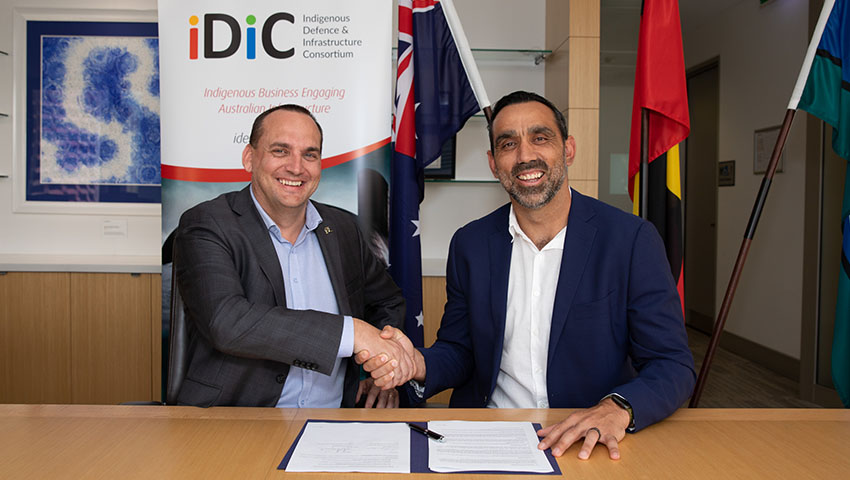A global pandemic, fractured supply chains and frosty trade relations – a turbulent 2020 has forced sovereign capability back into focus, with the Indigenous business sector primed and ready to support the nation’s record Defence investment and modernisation programs, explains Adam Goodes, CEO of the Indigenous Defence & Infrastructure Consortium (iDiC).
To continue reading the rest of this article, please log in.
Create free account to get unlimited news articles and more!
There has already been a spate of announcements to this effect, the latest being improvements to the Australian Industry Capability (AIC) program and a review into the Australian Standard for Defence Contracting. It demonstrates the Australian government is keenly aware of the need for “a defence force underpinned by Australian sovereign capability”.
But as we look to better cultivate the skills in our own backyard, I ask – what could be a more sovereign capability than Australia’s network of Indigenous businesses?
Disruption reveals opportunity. And as our industry casts its eyes towards the future of defence, we see the importance of Indigenous businesses playing a bigger role. But it will take partnership across the defence industry ecosystem. Without these relationships, without support, the Indigenous business sector will hover at the service provider level, without making valuable inroads to more meaningful contributions.
We already know the benefit of AIC. From a security perspective, Australian capability is critical to building a self-reliant defence industry that isn’t dependant on overseas supply chains. As the current recession starts to bite, investing in defence capability is not only a way to boost small business growth, but keep Australian government funding onshore.
But Indigenous businesses are a win-win for the broader defence industry, too. Most large companies have a corporate social responsibility (CSR) policy, diversity and inclusion teams or even Reconciliation Action Plans. These are all steps in the right direction, but the biggest way companies can make a difference to the Indigenous community isn’t talk – it’s action.
A defence contract is a long-running proposition. Acquisition and sustainment programs can run for 20 or 30 years. For small businesses, this is life changing. For Indigenous businesses, it can reshape generational wealth. Of the Indigenous-owned businesses we work with at iDiC, we estimate 66 per cent of their staff are Indigenous, too.
Further, a cost benefit analysis by Supply Nation found that for every dollar that was invested in an Indigenous business, an average of $4.41 was returned in economic and social value. You won’t find a better return on investment anywhere.
This isn’t about charity. In defence, you’re only as good as your last project. The Indigenous industry spans professional services, engineering, logistics, construction and creative services – businesses which hold their own in very competitive fields. Investing in these businesses not only provides better Australian capability, but it opens defence contractors up to the vast talent in these networks.
Better partnership is required to achieve this and help Indigenous businesses get a foot in the door. If you’ve never worked on a defence project or aren’t on a particular procurement panel, you’re automatically ruled out whether your capabilities match or not. Without a pre-existing relationship with a prime contractor, an Indigenous business won’t get a look in.
But the primary challenge for Indigenous businesses is fear of the unknown. Many large defence contractors haven’t worked with Indigenous businesses before. In a world where the environment is volatile and trust is in short supply, additional uncertainty can be a step too far.
This is why relationships are important. Because the benefits of working with an Indigenous business aren’t something that can be quantified by procurement departments. It isn’t CSR. It’s about doing good business; smart business. It’s about building networks that endure and further Australia’s capability.
And it will be more important in the future. With the uncertainty in the world today, I’m seeing trusted brands and relationships outweighing ‘value for money’ policy determinations. A reliable network of the right local skillsets will be key to moving forward.
Good policy is important; it means Australia is fair dinkum about sovereign capability. But giving Indigenous businesses the opportunity to add value requires more than regulation – we need the right partnership with industry and for this to be recognised by government.
COVID-19 has been an opportunity to pause and reflect on the Australia we want for the future. As defence continues to be a major part of government stimulus, our industry has the potential – and the responsibility – to take as many people on the journey as possible.
Sovereign capability means looking at the skills and talents we already have, and nurturing them for the future. Our vibrant, brilliant Indigenous business sector would be a fitting place to start.
Adam Goodes is the CEO of Indigenous Defence & Infrastructure Consortium (iDiC).

 Login
Login







